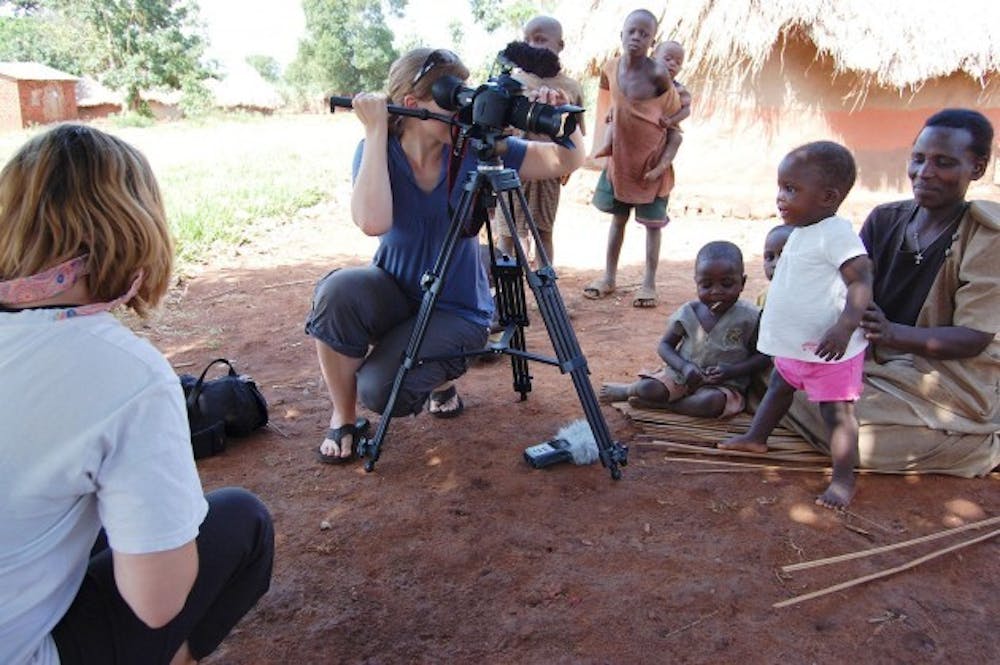There are currently over 40,000 institutionalized orphans in Uganda and the number is steadily growing.
Last Tuesday night at Hallwalls, Krista Hamlen, a media study graduate student at the University at Buffalo, presented Where We Belong, her recently completed documentary film that explores the inner dynamics of two orphan-related non-profit organizations in Jinja, Uganda.
The film provides an up-close and personal vantage point of Ekisa, an orphanage for children with disabilities, and of the Obukuumi Sponsorship Program, an organization that assists families in raising their children at home.
Much of the film was shot at Ekisa and includes interviews with the Ugandan women who work there and the two founders of the organization.
"When I was volunteering in Uganda in 2007, I was volunteering with one of the girls who opened the orphanage, and I've kept in contact with her ever since," Hamlen said. "When I heard what she was doing, I was immediately interested in what goes into that and how the relationships are between the Ugandans and the Western aid workers."
The documentary not only reveals the fluidity of this multi-national cooperation at Ekisa, but also how prevalent the issue of abandoned and neglected children is in Jinja.
It's a powerful and multifaceted film that left the majority of the audience inspired by what they saw.
"I'm blown away by her work," said Sarah Elder, media study professor, and Hamlen's advisor. "She's such a skilled filmmaker. You can teach your whole life, you can try as much as you want, but unless a student can learn and has talent to do what you're teaching, you get frustrated. So right now I'm near tears. She's been such a joy to work with."
Many of the subjects in the film are the caretakers of the orphan children at Ekisa. The majority of these women, referred to as "the mamas," were orphans themselves, and felt a sense of duty in looking after and teaching the children. Their lives are a testament to the ongoing struggle that many children are experiencing in Uganda.
Through enlightening interviews with locals and the leaders of the two organizations, many of the cultural conditions that lead to parentless children are explained.
"It seemed to me that everyone I met who was involved in this was a woman," Hamlen said. "I noticed that in the sponsorship program there was only one single father, where as there were a lot of single mothers. I was told by the 'mamas' that a lot of the time, it falls on the woman, while the men will be the ones who don't get involved."
The film focuses on many issues like this one, but does so through several different perspectives in order to remain neutral. Hamlen wants her audience to be able to draw their own conclusions from what they see. For this reason, unlike many traditional documentaries, there is no voice-over narration.
However, even Hamlen admitted that this objectivity is not entirely possible.
"I think it is impossible to be objective," Hamlen said. "Even though I was trying to collaborate with people, I chose the majority of the shots. There is a lot of me in there, that's kind of the inherent thing in documentary film - you can't get away from that."
Hamlen's camerawork was engrossing and dynamic, giving the audience the chance to put themselves in Jinja and at the orphanage. A lot of her shots were framed at the height of the orphans, which really enhanced the viewer's connection to the world of each child.
"Krista is a very skilled cinematographer and has clearly spent a lot of time thinking about the construction of her story," said Carolyn Tennant, media arts director of Hallwalls. "It's an interesting story on so many levels and it's really a privilege to get to hear a different perspective."
Hallwalls will hold its next independent film screening Can't Stop Reiman May 4.
Email: arts@spectrum.com





